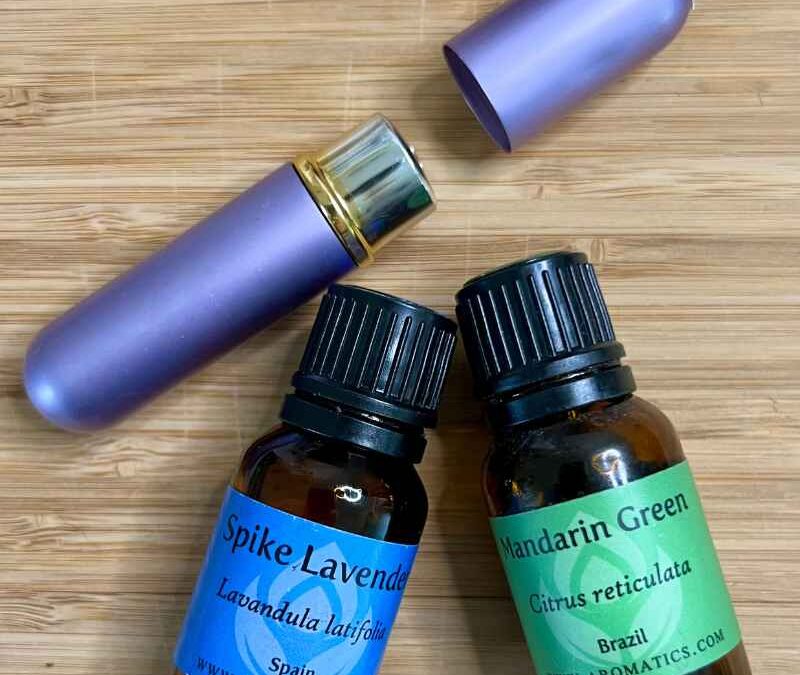Unlocking the Power of Aromatherapy Inhalers
Everything You Need to Know
Are you looking for a natural way to enjoy essential oils on the go to boost your mood, reduce stress, or improve your sleep? Aromatherapy inhalers might be just the solution you’ve been searching for. In this article, we’ll explore the world of aromatherapy inhalers, answering your burning questions about how they work, what they are, their benefits, and whether they are safe to use. Make sure you check out the aromatherapy inhaler blends at the end!
What is an Aromatherapy Inhaler?
Definition: An aromatherapy inhaler is a small, portable device that allows you to enjoy the therapeutic benefits of essential oils through inhalation. Unlike diffusers, which disperse oils into the air, inhalers deliver the aroma directly to your nose. Aromatherapy inhalers are the easiest way to travel with essential oils no matter the means of transportation. They are great to use in the office, grocery stores, or anywhere you may need a pick-me-up or some extra emotional support. Essential oil personal inhalers are a great option if you want to enjoy the aromatic benefits of aromatherapy but worry about diffusing because you have pets. Think of an aromatherapy inhaler as a personalized pocket-size diffuser.
Components: A typical aromatherapy inhaler consists of three main parts:
- A wick or absorbent pad that holds the essential oil. Look for organic cotton.
- A tube that encases the wick and directs the vapor. These can be plastic or glass.
- A cap that seals the inhaler to preserve the oils and keep everything clean.
How They Work: Aromatherapy inhalers release the aromatic compounds of essential oils when inhaled through the tube. This inhalation process allows the volatile molecules in the oils to interact with your olfactory system, influencing your mood, emotions, and overall well-being.
How Do Aromatherapy Inhalers Work?
Inhalation Process: When you gently breathe through the inhaler, the essential oil molecules are carried into your nasal passages. Here, they stimulate the olfactory receptors, sending signals to your brain that can trigger various physiological and emotional responses.
The Role of Essential Oils: Essential oils are the heart and soul of aromatherapy inhalers. Different oils offer different benefits. For instance:
- Lavender oil can promote relaxation and alleviate stress.
- Peppermint oil may boost alertness and concentration.
- Eucalyptus oil can help clear your sinuses and ease respiratory discomfort.
Benefits of Inhalation: Here’s why aromatherapy inhalers are gaining popularity:
- Stress and Anxiety Relief: Inhaling calming scents can help reduce stress and anxiety levels.
- Improved Sleep Quality: Certain oils can improve sleep quality by calming the mind.
- Enhanced Mood and Concentration: Aromatherapy inhalers can help uplift your mood and enhance focus.
- Portable Wellness: These little inhalers are easy to carry, making them perfect for on-the-go relaxation.
- Natural Allergy Relief: Some essential oils offer relief from allergy symptoms, without the side effects of traditional medications.
Are Aromatherapy Inhalers Safe?
General Safety Considerations: Using aromatherapy inhalers is generally safe, but it’s essential to keep a few things in mind:
- Allergies: Be cautious if you have allergies or sensitivities to specific oils.
- Consultation: When in doubt, consult with an aromatherapy professional or healthcare provider. *Always consult a healthcare provider before using essential oils with children, or if you are pregnant or breastfeeding.
Risks and Allergies: While rare, some individuals may experience mild allergies or sensitivities to certain essential oils. It’s always a good idea to do a patch test before regular use.
In conclusion, aromatherapy inhalers offer a convenient and enjoyable way to harness the power of essential oils for your well-being. By understanding how they work, the benefits they provide, and following safety guidelines, you can incorporate aromatherapy inhalers into your daily routine with confidence.
Aromatherapy Inhaler Blends:
- Anxiety Relief Blend:
- Stress Relief Blend:
- Bedtime Blend:
- Energy for the Gym Blend:
- Focus for Homework Blend:
- Mid-Day Pick-Me-Up Blend:
DIY Aromatherapy Inhaler Instructions:
Materials Needed:
- Aromatherapy inhaler tube with blank wick.
- Essential oils (chosen blend).
- Tweezers (optional)
Steps:
- Prepare Your Work Area: Find a clean space to work in. You will need a small clean, dry glass bowl, your desired essential oils, and tweezers are helpful but not required.
- Select Your Essential Oils: Choose the essential oils from the blend above that correspond to your desired effect (e.g., for anxiety relief, select Lavender, Bergamot, and Frankincense).
- Disassemble the Inhaler: Take the inhaler tube apart by removing the cap and the wick. The wick is usually a cotton or absorbent material.
- Craft your blend: In a small glass bowl, add the selected blend of essential oils. If crafting your own blend you’ll typically use 15-20 drops of essential oil in total for an aromatherapy inhaler.
- Prepare the Wick: Place the wick in the bowl and roll it around until it absorbs all of the essential oils.
- Reassemble the Inhaler: Put the wick back into the inhaler tube and screw on the cap tightly. *Tweezers are helpful for this step.
- Label Your Inhaler: To avoid confusion, label the inhaler with the purpose of the blend (e.g., “Anxiety Relief”).
- Allow the Blend to Mingle: Let the inhaler sit for a few hours to allow the oils to permeate the wick.
- Inhale and Enjoy: To use, simply remove the cap, place the inhaler near your nose, and take slow, deep breaths.
Remember that essential oils are potent, so always follow safety guidelines, and if you experience any irritation or discomfort, discontinue use. These DIY aromatherapy inhalers can be a wonderful addition to your daily wellness routine, helping you achieve your desired mood and energy levels naturally.
Have fun creating a life that naturally makes scents!
Read Next:
Essential Oils For Vertigo Relief
Essential Oil Blends For Allergies
The information provided here is intended for educational purposes only and is not a substitute for professional medical advice, diagnosis, or treatment. Essential oils are potent natural compounds that can offer various benefits when used appropriately.
Some of the links on this website are affiliate links, which means that we may earn a commission if you click on the link or make a purchase using the link. When you make a purchase, the price you pay will be the same whether you use the affiliate link or go directly to the vendor’s website using a non-affiliate link. By using the affiliate links, you are helping support our website, and we genuinely appreciate your support.



